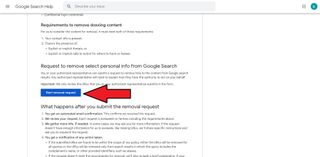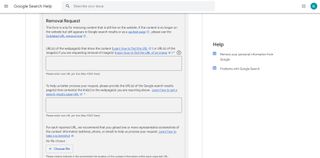Google now lets you remove your phone number and email address from search results — here's how
Get your personal info scrubbed from the web

Google published a blog post on Wednesday announcing that it's now allowing people to request the removal of their phone numbers, email addresses and physical addresses from search results.
The search engine giant already allowed privacy-concerned users to request Google's help in taking down personal information, but that was limited to bank account and credit card numbers, images of handwritten signatures, medical records, government ID data, and explicit, lewd personal content.
- The best laptops of the year
- Best antivirus apps in 2022
- Samsung Mother's Day deals: Save hundreds on Samsung devices
How to get your personal information scrubbed from Google Search
Google explained that the upside of its search engine is that it gives users access to information, but that shouldn't come at the cost of privacy and security. Thanks to the new policy expansion, Global Policy Lead for Search Michelle Chang said Google is "empowering people with the tools they need to protect themselves and keep their personally identifiable information private."
To submit a request to Google to have your personal information removed from Search, follow the instructions below.
1. Click here; you'll land on a page titled, "Remove select personally identifiable info (PII) or doxxing content from Google Search."
2. Scroll down and you'll see a blue button that says, "Start Removal Request." Click on it.

3. You'll come across a form that will ask what you'd like removed, where you saw the offending information, and whether you've contacted the website's owner. Tick your answers.
Stay in the know with Laptop Mag
Get our in-depth reviews, helpful tips, great deals, and the biggest news stories delivered to your inbox.
4. A new question will appear, asking you what specific type of personal information you're seeking to eradicate from search results. Answer accordingly.

5. A new form will pop up, prompting you to input URLs, upload screenshots, add additional context, and more to help Google make the best decision regarding your case. Once you've completed the form, tick the legal box and hit "Submit."
6. You should then get an email from Google confirming that it received your request.
Investigators will review your case, and if they need more information, they will reach out to you for more documentation. Once Google makes a decision, you'll receive an email detailing whether your request is denied or accepted.
Keep in mind that while you may be able to remove offending content from Google Search, the search engine tech giant doesn't have the authority to remove it from the internet entirely. For that, you'll have to contact the hosting sites directly.
Kimberly Gedeon, holding a Master's degree in International Journalism, launched her career as a journalist for MadameNoire's business beat in 2013. She loved translating stuffy stories about the economy, personal finance and investing into digestible, easy-to-understand, entertaining stories for young women of color. During her time on the business beat, she discovered her passion for tech as she dove into articles about tech entrepreneurship, the Consumer Electronics Show (CES) and the latest tablets. After eight years of freelancing, dabbling in a myriad of beats, she's finally found a home at Laptop Mag that accepts her as the crypto-addicted, virtual reality-loving, investing-focused, tech-fascinated nerd she is. Woot!
